- Home
- Hermann Hesse
Knulp Page 8
Knulp Read online
Page 8
"I don't know. -- Well, yes, I do know. It's downhill, Schaible, every day a little faster. Good thing I'm all alone in the world and no burden to anybody."
"Whichever way you take it. That's your business. But I'm sorry to hear it."
"No need to be. We've all got to die some day, it even comes to stone-breakers. Yes, old-timer, here we sit, and neither of us has much call for rejoicing. You had different plans for yourself once. Didn't you want to work for the railroad?"
"Oh, that's ancient history."
"And your children? Are they well?"
"As far as I know. Jakob's working."
"Really? The time passes. Well, I'll be going now."
"What's the hurry? After all these years. Look, Knulp. Can I help you? I haven't got much on me, maybe half a mark."
"You can use it yourself. Thanks all the same."
He wanted to say something more, but his chest ached wretchedly and he fell silent. The stone-breaker gave him a drink from his cider bottle. For a time they looked down at the town, the millrace flashed in the sunlight, a wagon drove slowly over the stone bridge, and below the weir a gaggle of white geese swam indolently to and fro.
"I'll be getting on," Knulp announced once more. "I'm rested now."
The stone-breaker sat deep in thought. He shook his head.
"You know," he said slowly, "you could have been something more than a poor tramp. It's a damn shame. I've never been a psalm singer, but I believe what it says in the Bible. You'd better be thinking about it too. You'll have to answer for yourself, and it won't be easy. You had gifts, more than a lot of other people, and you made no use of them. Don't be angry with me for saying so."
Knulp smiled; there was a glimmer of the old innocent mischief in his eyes. He gave Schaible a friendly tap on the shoulder and stood up.
"We'll see, Schaible. Maybe God won't ask me why I didn't get to be a judge. Maybe he'll just say: Back again, you old fool? -- and give me an easy job minding children, or some such thing."
Andres Schaible shrugged his shoulders under his blue-and-white checked shirt.
"No use trying to be serious with you. You think God will just crack jokes when Knulp comes along."
"Not at all. -- Or maybe he will."
"Don't talk like that."
They shook hands and the stone-breaker supped Knulp a small coin that he had secretly dug out of his trousers pocket. And not wishing to spoil his old friend's pleasure, Knulp took it without protest.
He cast a last glance down into his native valley and nodded once more to Andres Schaible. Then, seized with a fit of coughing, he hurried off. He soon rounded the bend and vanished behind the woods.
Two weeks later, after a period of cold fog had given way to sunny days brightened by late bluebells and cool ripe blackberries, the winter suddenly set in. First, three days of bitter cold; then, as the cold abated, a fast, heavy snowfall.
All this time Knulp had been circling aimlessly, never leaving his home ground; twice, hidden in the woods, he had seen Schaible, but he had not called out. He had too much to think about. In the course of his long, useless marches he had sunk deeper and deeper into the tangle of his botched life as into a clump of brambles, and still he had found no meaning or consolation. Then, feeling very sick and faint, he had thought of returning to Gerbersau and knocking at the door of the hospital. But when after days of being alone he saw the town down below, the sounds that rose up to him were alien and hostile, and he knew that the town was no longer his place. From time to time he bought a piece of bread in one of the villages, and there were plenty of hazelnuts. He spent the nights in woodcutters' cabins or in the fields, bedded in straw.
Now he was crossing back from Wolf Mountain through the snowstorm, tired and wasted but still on the move, trudging on, exploring every copse and clearing, as though to make the most of his last meager provision of days. Sick and tired as he was, his eyes and nose were still alert; peering and sniffing like a hunting dog, he registered every rise and fall in the ground, every breeze, every animal track, though he no longer had any aim in view. His will had left him and his legs moved of their own accord.
In his thoughts he was talking with God; for several days he had been with Him almost uninterruptedly. He was not afraid; he knew that God can do us no harm. They were talking about the futility of Knulp's life: how things might have been managed differently and why this and that had had to be as it was and not otherwise.
"That was the time," Knulp repeated over and over again. "When I was fourteen and Franziska failed me. Everything was still possible. And then something went to pieces inside me; from then on I was no good. -- You should have let me die when I was fourteen. That was the big mistake. Then my life would have been as beautiful and perfect as a ripe apple."
But God smiled all the while, and sometimes his face disappeared in the driving snow.
"Come along, Knulp," he said reprovingly. "Think of your youth, that summer in the Odenwald and the times in Lächstetten. Didn't you dance like a deer, didn't you feel the joy of life in every bone? Didn't you sing and play the accordion till all the girls had tears in their eyes? Do you remember the Sundays in Bauerswil? And Henriette, your first sweetheart? Was all that nothing?"
Knulp thought back, and the joys of his youth flared up in their dark beauty like distant fires in the mountains; they had the heavy sweet fragrance of honey and wine and the deep rich sound of the warm night wind at the approach of spring. Dear Lord, how lovely it had been, how lovely in joy and sorrow, and what a pity if he had lost a single day of it!
"Yes," he admitted, "it was beautiful." Yet he felt tearful and cranky, like a tired child. "It was beautiful in those days. True, there was sadness even then, and sometimes a feeling of guilt. But it's true, those were good years. Surely few men have drunk so deeply or danced so grandly or known such nights of love as I did. But it should have ended then. Even in those days there was a drop of bitterness, I remember well, and after that there were never again such good times. No, never again."
God had vanished in a snow flurry. Knulp stopped for a moment to catch his breath and spit a drop or two of blood into the snow. And suddenly God was there to answer him.
"See here, Knulp, aren't you a bit ungrateful? You make me laugh with your forgetfulness. We've remembered the time when you were king of the dance floor, we've remembered your Henriette, and you've had to admit there was a point to all that, that those days were good and beautiful and brought you happiness. But, my dear fellow, if that's the way you feel about Henriette, you must have a thought or two for Lisabeth. Have you forgotten her entirely?"
And again a stretch of the past lay before Knulp's eyes like a distant mountain range. And though it was not quite so happy and carefree as the days that had gone before, it shone with a deeper fervor, with the quiet light of a woman smiling through tears. Long-forgotten days and hours rose from their graves. And in the midst of them stood Lisabeth with lovely sad eyes, holding her little boy in her arms.
"I've been a bad man!" he lamented. "After Lisabeth died, I had no right to go on living."
But God interrupted him. With a piercing look of his bright eyes, he said: "Enough of that, Knulp. You hurt Lisabeth very much, we can't change that, but you know perfectly well that the kindness and tenderness you gave her outweighed the harm, and that she was never angry with you for one moment. You childish fellow! Can't you see what it all means? Can't you see that you had to be a gadabout and a vagabond to bring people a bit of child's folly and child's laughter wherever you went? To make all sorts of people love you a little and tease you a little and be a little grateful to you?"
After a short silence Knulp admitted in a whisper: "Yes, come to think of it, you're right. But that was all in the old days, when I was young. Why didn't I learn a lesson from all that and make something of myself? There was still time."
The snow was no longer fairing. Again Knulp stopped to rest. He meant to shake th
e snow off his hat and clothes, but he didn't get around to it, he was tired and lost in thought. Now God was standing right before him, His wide-open eyes gleaming like the sun.
"Let well enough alone," said God. "What's the good of complaining? Don't you see that whatever happened was good and right, that nothing should have been any different? Would you really want to be a gentleman now, or a master craftsman with a wife and children, reading the paper by the fireside? Wouldn't you run away again this minute to sleep in the woods with the foxes and set traps for birds and catch lizards?"
Again Knulp started off, unaware that he was staggering with weariness. He felt much happier now and nodded gratefully to everything God said.
"Look," said God. "I wanted you the way you are and no different. You were a wanderer in my name and wherever you went you brought the settled folk a little homesickness for freedom. In my name, you did silly things and people scoffed at you; I myself was scoffed at in you and loved in you. You are my child and my brother and a part of me. There is nothing you have enjoyed and suffered that I have not enjoyed and suffered with you."
"Yes," said Knulp, nodding heavily. "Yes, that's true, and deep down I've always known it."
He lay resting in the snow. His weary limbs had grown light and his inflamed eyes smiled.
When he closed them to sleep a little, he still heard God's voice speaking and still looked into His bright eyes.
"So you've nothing more to complain about?" God's voiced asked.
"Nothing more," Knulp nodded with a shy laugh.
"And everything's all right? Everything is as it should be?"
"Yes," he nodded. "Everything is as it should be."
God's voice became softer. Now it sounded like his mother's voice, now like Henriette's, and now like the good, gentle voice of Lisabeth.
When Knulp opened his eyes again, the sun was shining. It dazzled him so that he quickly lowered his lids. He felt the snow lying heavy on his hands and wanted to shake it off, but the desire to sleep had grown stronger than any other desire.
Scan Notes, v3.0: Proofed carefully against DT, italics and special characters intact.

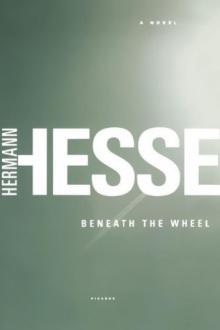 Beneath the Wheel
Beneath the Wheel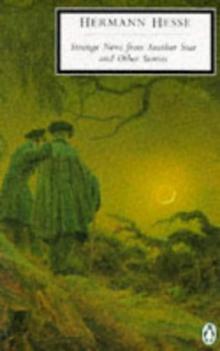 Strange News From Another Star
Strange News From Another Star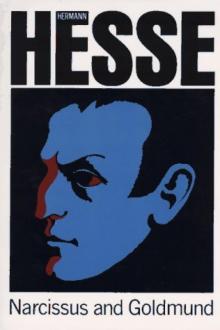 Narcissus and Goldmund
Narcissus and Goldmund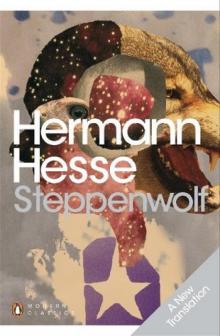 Steppenwolf
Steppenwolf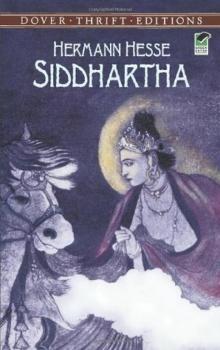 Siddhartha
Siddhartha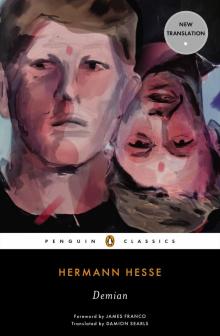 Demian
Demian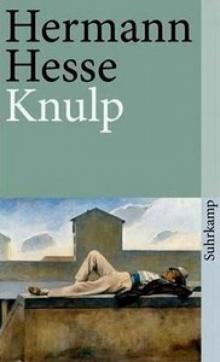 Knulp
Knulp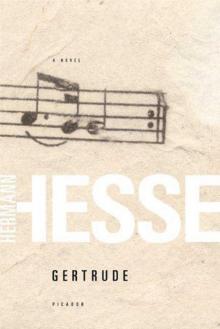 Gertrude
Gertrude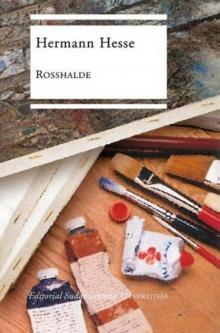 Rosshalde
Rosshalde The Glass Bead Game
The Glass Bead Game The Journey to the East
The Journey to the East Klingsor's Last Summer
Klingsor's Last Summer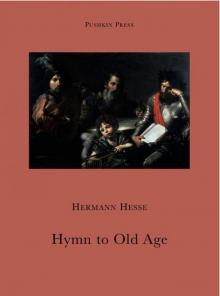 Hymn to Old Age
Hymn to Old Age Poems
Poems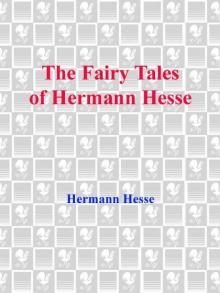 The Fairy Tales of Hermann Hesse
The Fairy Tales of Hermann Hesse Singapore Dream and Other Adventures
Singapore Dream and Other Adventures Soul of the Age
Soul of the Age